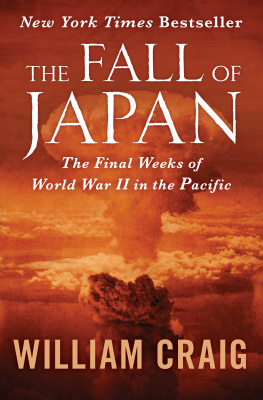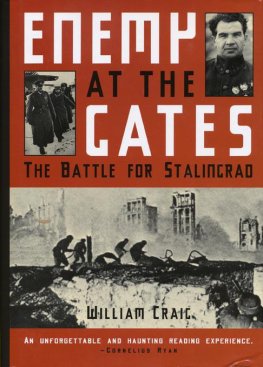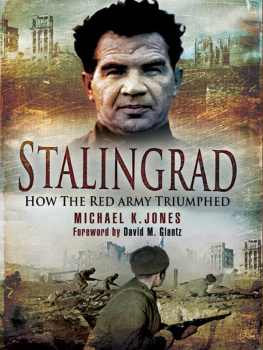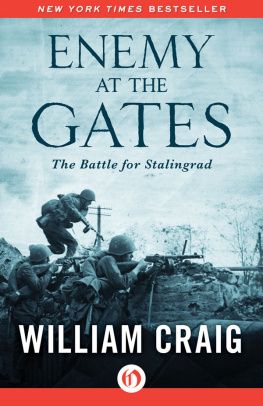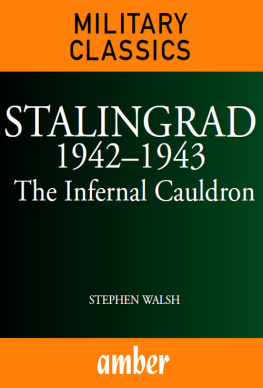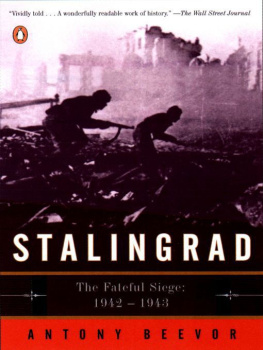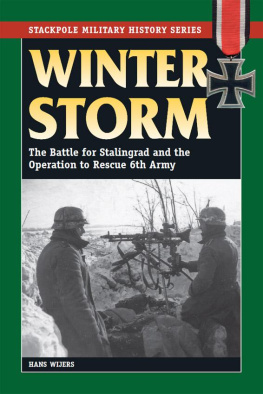PENGUIN BOOKS
ENEMY AT THE GATES
William Craig (1929-97), a native of Concord, Massachusetts, was educated at Columbia University. His first book, The Fall of Japan, was a documentary account of the last weeks of the Second World War in the Pacific. His first novel, The Tashkent Crisis, a thriller about espionage and international politics, was published in 1971. Enemy at the Gates is the culmination of five years of research, during which he travelled extensively on three continents, studying documents and interviewing hundreds of survivors of Stalingrad.
During the past four years many people have contributed their time and knowledge to this book. They have also shown great hospitality and kindness to a stranger. My sincere gratitude is extended to the following:
Alexander Akimov, Guiseppe Aleandri, Wilhelm Alter, Max Aust, Helmut Bangert, Herbert Barber, Dora Barskaya, Raya Barskaya, Shura Barskaya, Heinrich Bartels, Eugen Baumann, Winrich Behr, Gunter von Below, Luba Bessanova, Karl Binder, Felice Bracci, Hans Braunlein, Friedrich Breining, Franz Brendgen, Franz Broder, Mikhail Bruk, Ekkehart Brunnert, Cristoforo Capone, Horst Caspari, Ignacy Changar, Leo Checkver, Tania Chernova, Mrs. David DaIlin, Franz Deifel, Gregori Denisov, Pyotr Deriabin, Fritz Dieckmann, Gerhard Dietzel, Karl Englehardt, Berthold Englert, Paul Epple, Clemens Erny, Isabella Feige, Karl Floeck, Georg Frey, Karl Geist, Werner Gerlach, Wilhelm Giebeler, Heinz Giessel, Jacob Grubner, Hersch Gurewicz, Mrs. Kurt Hahnke, W. Averell Harriman, Gerhard Hassler, Adolf Heusinger, Otto von der Heyde, R.M.A. Hirst, Mrs. Hermann Hoth, Georgi Isachenko, Donat Ismaev, Lucy Jarvis, Vasile Jirjea, Hans Jlich, Dionys Kaiser, Leah Kalei, Anton Kappler, Hermann Kistle, Liora Keren, Fritz Kliem, Heinrich Klotz, Herbert Kreiner, Wilhelm Kreiser, Ottmar Kohler, Vadim Komolov, August Kronmller, Joseph Lapide, Heinz Lieber, Josef Linden, Eberhard von Loebbecke, Alexander Makarov, Veniero Marsan, Xaver Marx, Emil Metzger, Josef Metzler, Gerhard Meunch, Heinz Neist, Hans Oettl, Karl Ostarhild, Vittorio Paolozzi, Ernst Paulus, Wolf Pelikan, Alexei Petrov, Albert Huger, Boris Pishchik, Wilhelm Plass, Rudi Pothmann, Mesten Pover, Vincenzo Pugliese, Ugo Rampelli, Enrico Reginato, Herbert Rentsch, Carl Rodenburg, Manfred Rohde, Stelio Sansone, KiriII Sazykin, Arthur Schmidt, Albert Schein, Heinz Schroter, Hans Schueler, Kurt Siol, Gottlieb Slotta, Abraham Spitkovsky, Oskar Stange, Eugene Steinhilber, Giorlamo Stovali, Friedrich Syndicus, Rudolf Taufer, Nikolai Tomskuschin, Andrea Valletta, Siegfried Wendt, Hubert Wirkner, Ernst Wohlfahrt, Pyotr Zabavskikh.
There were others whose generous assistance greatly eased my journey across three continents and 50,000 miles: Konrad Ahlers, William E. Andersen, Ronay Ant, James Atwater, Charles E. Bohlen, Patricia Carey, Edward Craig, Anatoly Dobrynin, Virginia Gough, Donald Irwin, Siegfried Kaiser, Eugene King, Joseph Kolarek, David Laor, Renata Libner, Prof. Edward A. McCormick, Neville Nordness, Charles E. Northrop, Doris Orgel, A. A. Pishchotkin, P. Ramroth, Prof. John Roche, Eugenie Schneider, Joseph Skobel, G. Sosin, Malcolm Tarlov, Prof. Peter Viereck, Lucien Weisbrod, Hans Willee.
Archives and archivists have been of tremendous value to my research: In the United States: Office, Chief of Military History, Washington, D. C. Charles MacDonald, Hannah Zeidlik, Earl Ziemke; The Federal Records Center, Alexandria, VirginiaWilbur Nigh and Lois Aldridge; the National Archives, Washington, D. C.Joseph Bauer, Thomas Hohmann and John Taylor; The Library of Congress; The New York Public Library, Main Branch; Columbia University, Butler Library and International Affairs Library; Yale University, Sterling Memorial Library; Harvard University, Widener Library; Westport, Connecticut Public Library.
In Europe: Freiburg: The Research Center for Military HistoryMessrs. Arenz, Hermann and Stahl; Munich: The Commission for History of German Prisoners of WarDr. Erich Maschke; The Institute for the Study of the USSRLeon Barat, Peter Krushin; The Institute for World History; Nuremberg: The Club for Former Stalingrad Fighters.
In Israel: Jerusalem: Yad Vashem Documentation Center.
In Russia: Volgograd: The Volgograd Defense MuseumColonel Gregori Denisov.
And finally, special thanks to those most intimately connected with my project:
To the Reader's Digest offices in Stuttgart: Frau Morike, Brigitte Berg, Annalise Gekeler, and, in particular, the late Arno Alexy; in Rome and Milan: Doctors Fiocca and Polla; in Washington: Julie Morgan; in New York: Jo Ann Schuman.
To Conrad Sponholz and the staff of the MacDowell Colony in Peterboro, New Hampshire, for giving me a chance to collect my thoughts.
To Richard Baron, who helped carry the burden for a long time.
To my agent Don Congdon, who so patiently listened and advised.
To Mrs. Dora Israel, a brilliant researcher, who diligently located and translated most of the Russian material.
To Kenneth Wilson, a gracious man whose faith and support meant so much to me.
To editor Nancy Kelly, whose deep sensitivity to the story and the author profoundly influenced the final draft.
And most particularly, to Bruce Lee, managing editor of the Reader's Digest Press, whose constant encouragement and astute editorial judgment contributed immeasurably to the manuscript. From the very first day, he, more than anyone, understood the complexities and magnitude of the effort. I am deeply grateful to him.
Accoce, Pierre, and Quet, Pierre. The Lucy Ring. London: 1967.
Adam, Wilhelm. The Hard Decision. E. Berlin: 1967.
Afanasyev, I. F. House of the Soldiers' Fame. 2d ed. Volgograd: 1966.
Agapov, B. After the BattleStalingrad Sketches. London: 1943.
Armstrong, J. A., ed. Soviet Partisans in World War II. Madison, Wis.: 1964.
Bachurin, A. P. Front Line Memoirs. Moscow: 1962.
Baldwin, Hanson W. Battles Lost and Won. New York: 1966.
Batov, P. I. In Campaigns and Battles. Moscow: 1962.
Bekker, Cajus. The Luftwaffe War Diaries. New York: 1968.
Belov, K. S. From the Volga to Prague. Moscow: 1966.
Bergschicker, Heinz. Stalingrad: Battle on the Volga. E. Berlin: 1960.
Biryukov, N. I. Battle for Stalingrad. Volgograd: 1962.
. Two Hundred Days in Battle. Volgograd: 1963.
Biryusov, S. S. Rough Years. Moscow: 1966.
. When the Cannons Thundered. Moscow: 1962.
Care11, Paul. Hitler Moves East 1941-43. Boston: 1965.
Cassidy, Henry. MoscowDateline. Boston: 1943.
Chuikov, V. I. The Army of Mass Heroism. Moscow: 1958.
. The Battle for Stalingrad. New York: 1964.
. Heroism Without Precedent. Moscow: 1965.
. One Hundred Eighty Days in Battle Fire. Moscow: 1962.
Churchill, Winston. The Second World War. 6 vols. Boston: 1948-1953.
Chuyanov, A. S. Stalingrad Is Reviving. Moscow: 1944.
Clark, Alan. Barbarossa. New York: 1964.
Conquest, Robert. The Great Terror. New York: 1968.
Dahms, Hellmuth. History of the Second World War. Tubingen: 1965.
DaIlin, Alexander. German Rule in Russia, 1941-45. London: 1957.
Deriabin, Peter, and Gibney, Frank. The Secret World. New York: 1959.
Dibold, Hans. Doctor at Stalingrad. London, 1958.
von Dieckhoff, Gerhard. The Third Infantry Division (Motorized). Gottingen: 1960.
Doerr, Hans. The Campaign to Stalingrad. Darmstadt: 1955.
Druzhinin, D. V. Two Hundred Fiery Days. Moscow: 1968.
Epic Story of Stalingrad, The. (Collection). London: 1943.
Next page

